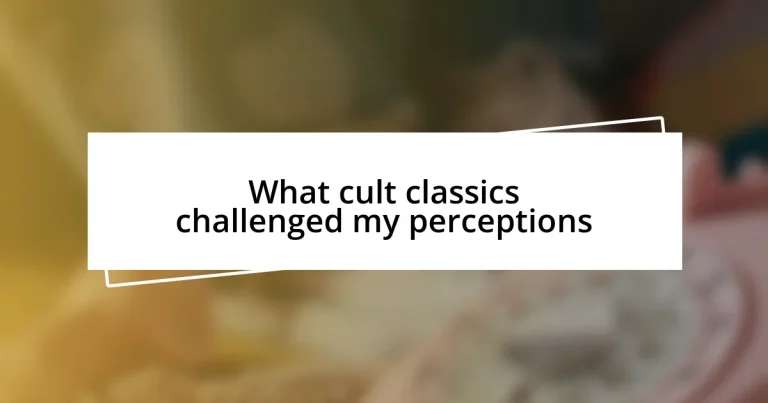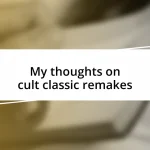Key takeaways:
- Cult classics defy mainstream storytelling, encouraging unique narratives and deep audience engagement.
- They often explore challenging themes like identity, existentialism, and moral ambiguity, prompting introspection.
- Notable cult classics like “Donnie Darko,” “The Big Lebowski,” and “Clerks” leave lasting impressions and provoke personal reflection.
- The humor and unconventional perspectives found in these films offer valuable lessons about humanity and navigating life’s complexities.
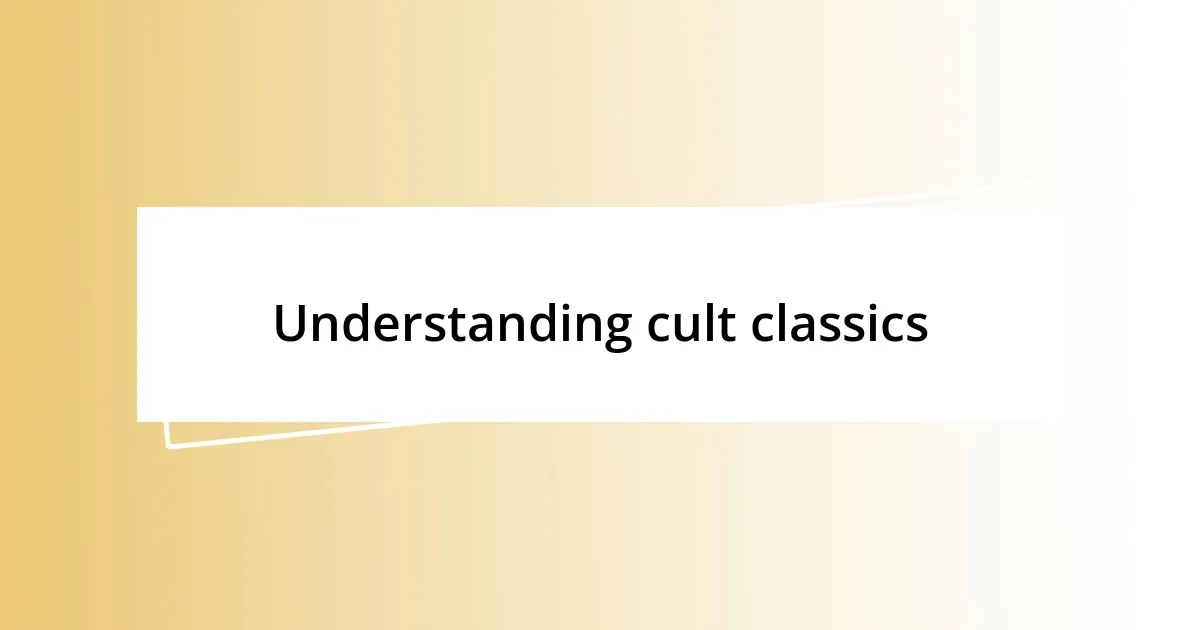
Understanding cult classics
Cult classics are fascinating pieces of cinema that often fly under the radar, only to find a passionate following over time. I remember the first time I watched “The Room.” It was a mixed bag—confusion, laughter, and disbelief all rolled into one experience. How did this film, often criticized for its flaws, become a beloved favorite for so many people?
What strikes me about cult classics is their ability to challenge mainstream perceptions. They defy conventional storytelling, allowing for unique narratives that resonate deeply with certain audiences. For instance, when I stumbled upon “Donnie Darko,” I felt an unsettling connection to its themes of time travel and existential dread. It made me question not just the film itself, but my own understanding of reality and choices.
Watching these films becomes a communal experience, where sharing interpretations adds a layer of enjoyment. Have you ever found yourself in a passionate debate about a movie that others might deem unwatchable? I vividly recall long nights arguing with friends about “Fight Club” and the philosophical implications behind its wild twists. It’s this kind of engagement that fuels the cult classic phenomenon—drawing people together through shared exploration of the unusual.
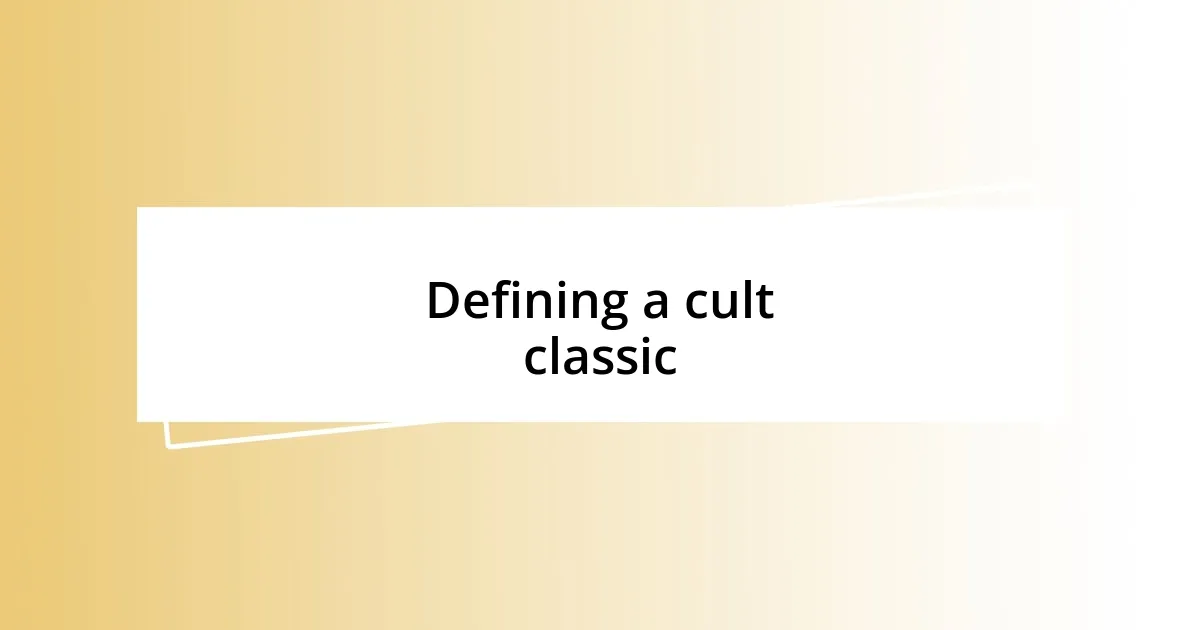
Defining a cult classic
Cult classics are often films that deviate from the norms established by mainstream cinema. They embrace unconventional themes, quirky characters, and unique storytelling techniques. I’ve found that these films often resonate because they speak to a sense of individuality. When I first watched “Eraserhead,” I was struck by its surreal imagery and haunting soundscape—an experience that lingered with me long after the credits rolled.
What truly sets cult classics apart is their ability to cultivate dedicated fan bases. These films invite viewers to engage with them on a deeper level, often inspiring theories or fan cultures. For example, my friends and I used to host “Rocky Horror Picture Show” nights, complete with costumes and participation. It was this shared enthusiasm that made each viewing an immersive experience, transforming the act of watching a film into a celebration of its eccentricities.
The term “cult classic” itself implies a certain level of devotion from its audience; it suggests a movie that may not have found success at the box office but has since been embraced by a fervent community. I can relate to this journey of discovery. Finding a film that others may overlook often feels like unearthing a hidden gem. That sensation fuels my passion for cinema, keeping me curious about what other unconventional narratives await.
| Feature | Description |
|---|---|
| Audience Reception | Often polarizing, but deeply loved by a devoted fan base. |
| Themes | Frequently explore unconventional or taboo subjects. |
| Cultural Impact | Creates a shared cultural experience, fostering community engagement. |
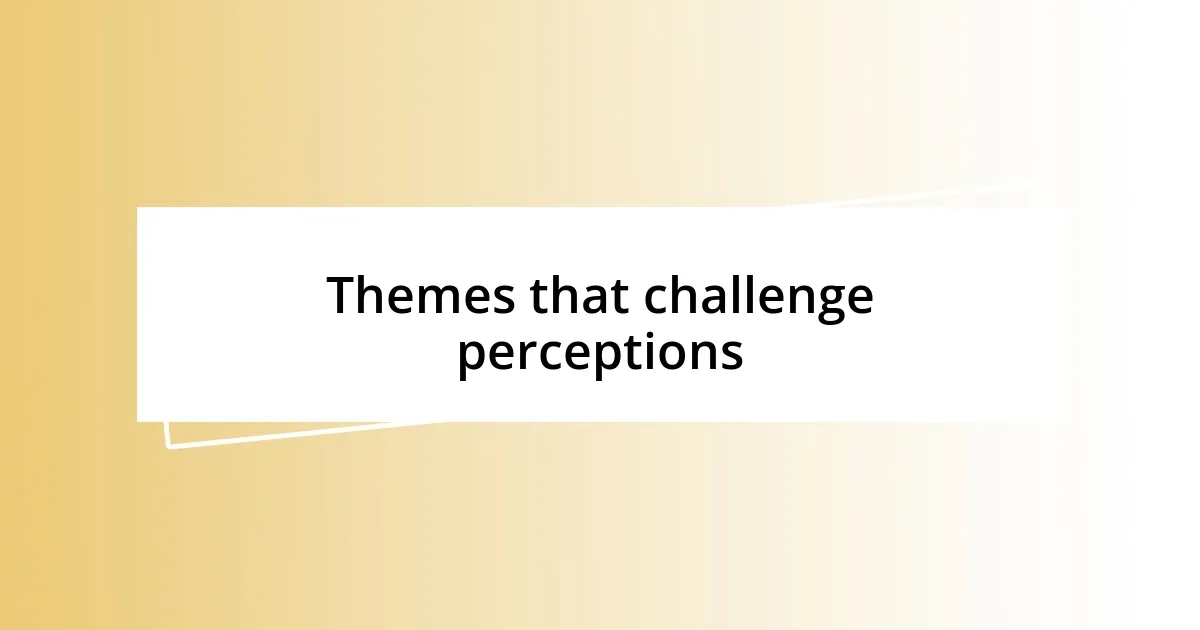
Themes that challenge perceptions
One of the most intriguing themes in cult classics is the exploration of identity and self-perception. Films like “Pink Flamingos” push the boundaries of societal norms, provoking strong reactions about what we deem acceptable. I recall my first viewing of “The Graduate,” where I felt a profound mix of sympathy and frustration for the protagonist, Benjamin Braddock. His existential crisis felt eerily relatable, challenging my own views on success and societal expectations at that age.
These films can challenge deeply ingrained beliefs, fostering discussions that might feel uncomfortable but ultimately enlightening. Here are some key themes that challenge perceptions:
- Rebellion against societal norms: Characters often embody a resistance to traditional roles or expectations.
- Existentialism: Many films provoke thoughts about life’s meaning and our place in it.
- Non-conformity: They celebrate uniqueness, encouraging viewers to embrace their individuality.
- Moral ambiguity: These films often present moral dilemmas that make us reconsider our judgments about right and wrong.
- Taboo subjects: Cult classics frequently tackle topics that mainstream cinema avoids, opening up spaces for important conversations.
In my experience, these themes resonate long after the credits roll, prompting introspection and a reevaluation of personal beliefs.
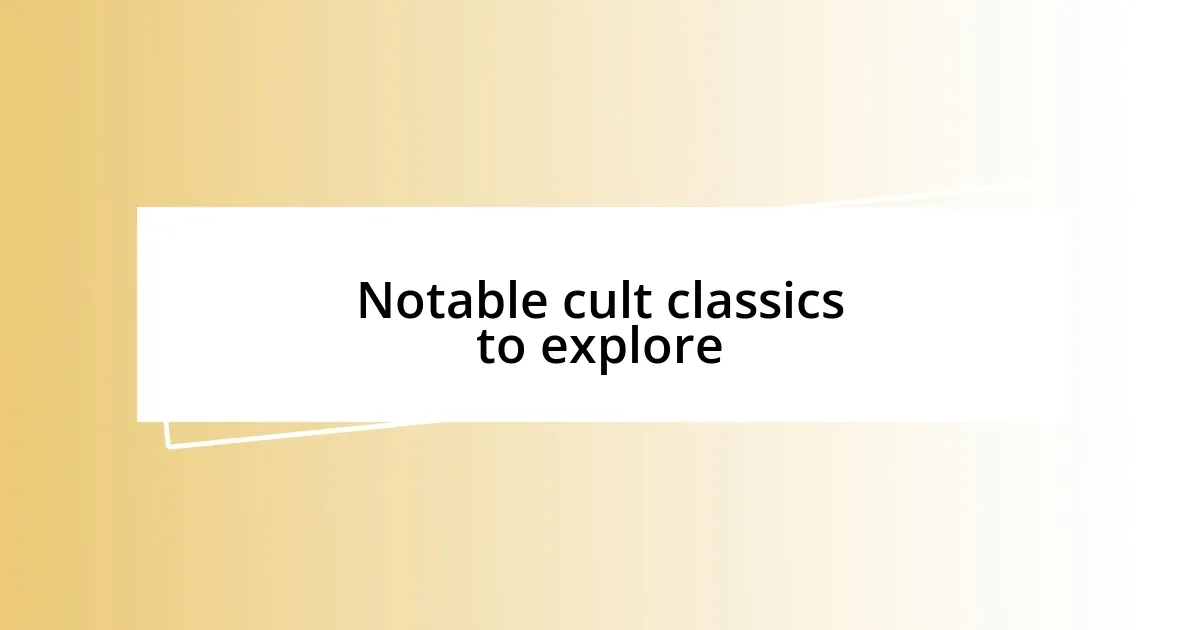
Notable cult classics to explore
When it comes to notable cult classics to explore, “Donnie Darko” stands out for its mind-bending narrative and exploration of time travel and mental health. The first time I watched it, I was completely captivated by the eerie atmosphere and the complexity of Donnie’s character. Have you ever walked away from a movie with more questions than answers? That’s precisely the effect this film had on me, leaving me pondering existential themes long after the credits rolled.
Another film that deserves a spot is “The Big Lebowski.” I remember my friends and I quoting lines from it for weeks after our first viewing. Its absurd humor and laid-back philosophy genuinely resonated with me. The characters are so uniquely crafted that they become fascinating reflections of different aspects of society. Isn’t it incredible how a film can make you laugh and then leave you contemplating your own identity, all while embracing the power of just “going with the flow”?
Lastly, I can’t talk about cult classics without mentioning “Clerks.” Filmed in black and white, it offers an authentic glimpse into the lives of two twenty-something clerks. I found myself relating to the mundane yet profound conversations they had, which somehow captured the essence of youthful uncertainty. Have you ever felt like your daily life was a series of small, yet significant, moments? This film makes you recognize the beauty in the ordinary, reminding us that even the most mundane settings can become the backdrop for extraordinary stories.
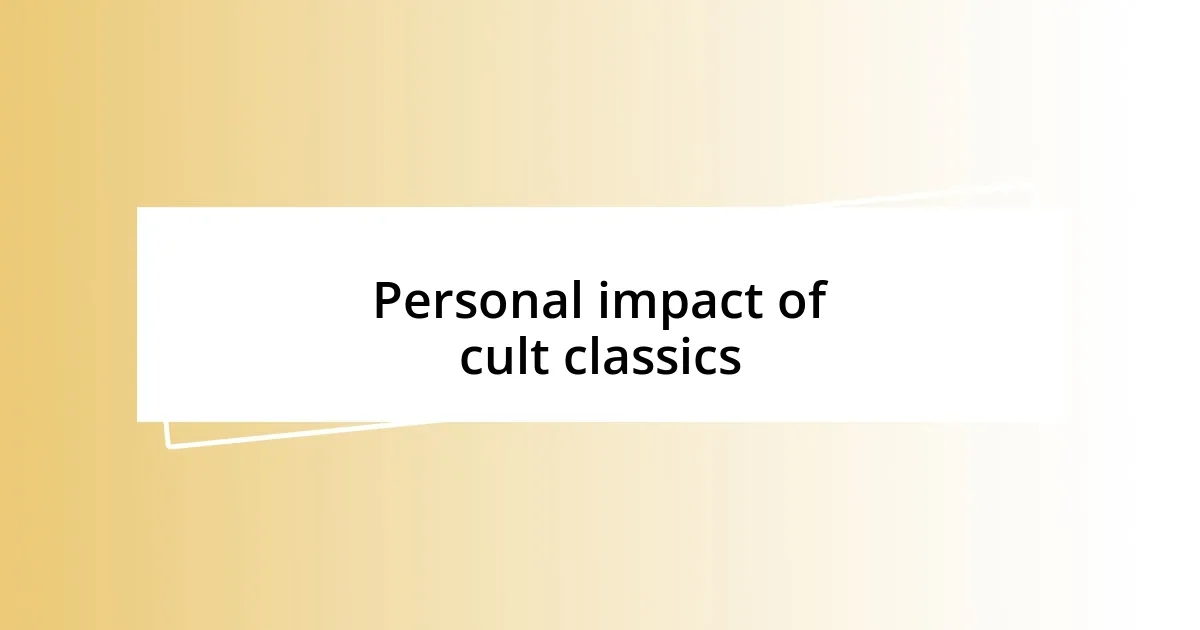
Personal impact of cult classics
Cult classics have a way of weaving themselves into our lives, leaving lasting impressions that often shape our perceptions. I remember the first time I watched “Fight Club.” It stirred something within me, igniting questions about masculinity and consumer culture that I hadn’t fully considered before. Suddenly, I was reflecting on how much of my identity was tied to possessions and societal expectations.
Watching “Heathers” was another turning point. It distilled the complexities of teenage life into sharp, witty dialogue and unsettling situations. I felt a mix of laughter and discomfort, realizing how often I had navigated the treacherous waters of peer pressure. Have you ever encountered a film that mirrors your own experiences so closely that it feels almost uncomfortable? That’s the exact reaction I had; it forced me to confront the role conformity played in my own teenage years.
The emotional weight of these films doesn’t just fade away after the credits roll; it lingers, prompting a deeper dialogue within myself. I often find myself thinking back to “The Room,” not for its infamous reputation, but for how it challenges my understanding of failure and ambition. It’s a reminder that imperfections can spark a conversation. Isn’t it fascinating how a film that seems so absurd on the surface can evoke such profound self-reflection? Each viewing reinforces the idea that we are, in many ways, shaped by the narratives we consume.
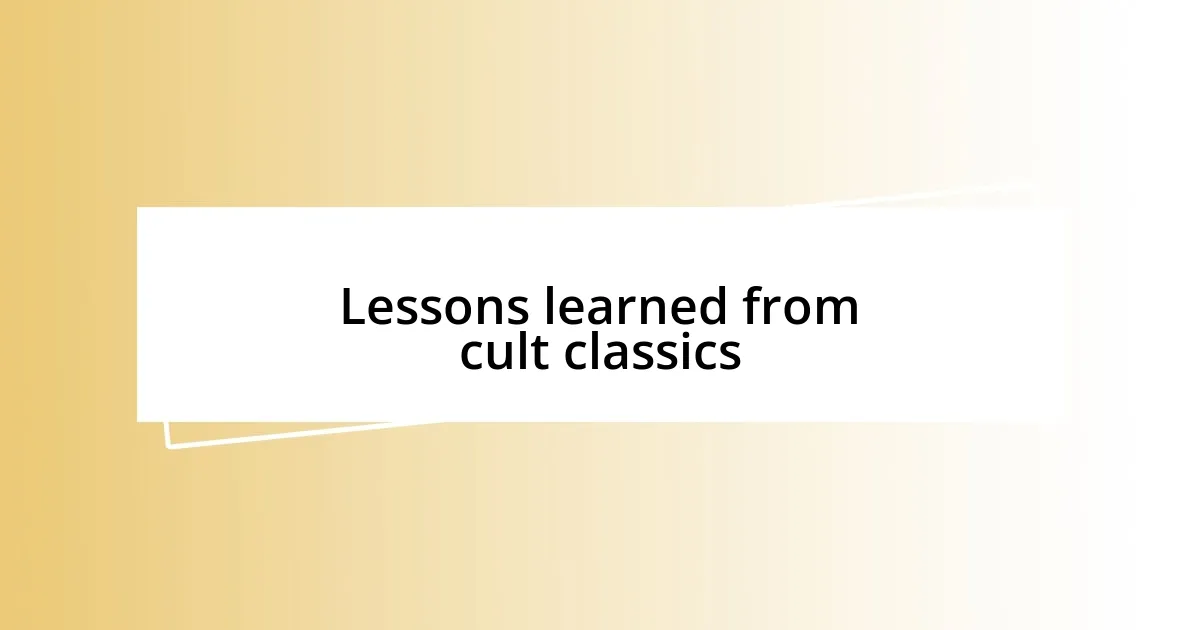
Lessons learned from cult classics
Cult classics often challenge the status quo, opening my eyes to new perspectives that I didn’t even know I needed. For instance, when I watched “Trainspotting,” I was struck by its raw depiction of addiction and the impact it has on relationships. It made me reflect more on the importance of empathy in understanding someone else’s struggles. Have you ever found yourself seeing the world through someone else’s eyes even for just a moment? It’s a powerful lesson about the complexity of human experiences.
One of the most profound revelations from cult classics is how they embrace the flawed nature of humanity. After experiencing “Ghost World,” I found myself pondering the struggles of finding one’s identity in a world that often feels superficial. The characters’ awkwardness and uncertainty resonated deeply with me. I realized that navigating adulthood doesn’t have a clear manual; it’s filled with contradictions and unexpected turns. How often do we allow ourselves to feel vulnerable about those uncertainties? That recognition has transformed the way I approach my own life choices.
Additionally, the humor found in cult classics like “Shaun of the Dead” taught me the value of facing fears with a light heart. As I laughed through the absurdity of a zombie apocalypse intertwined with mundane life, I reflected on my own challenges. It encouraged me to seek humor even in adversity. What if we could approach our toughest moments with a smile? That shift in mindset can be refreshing, reminding us that while life may throw curveballs, a sense of humor can help us navigate through chaos more gracefully.












